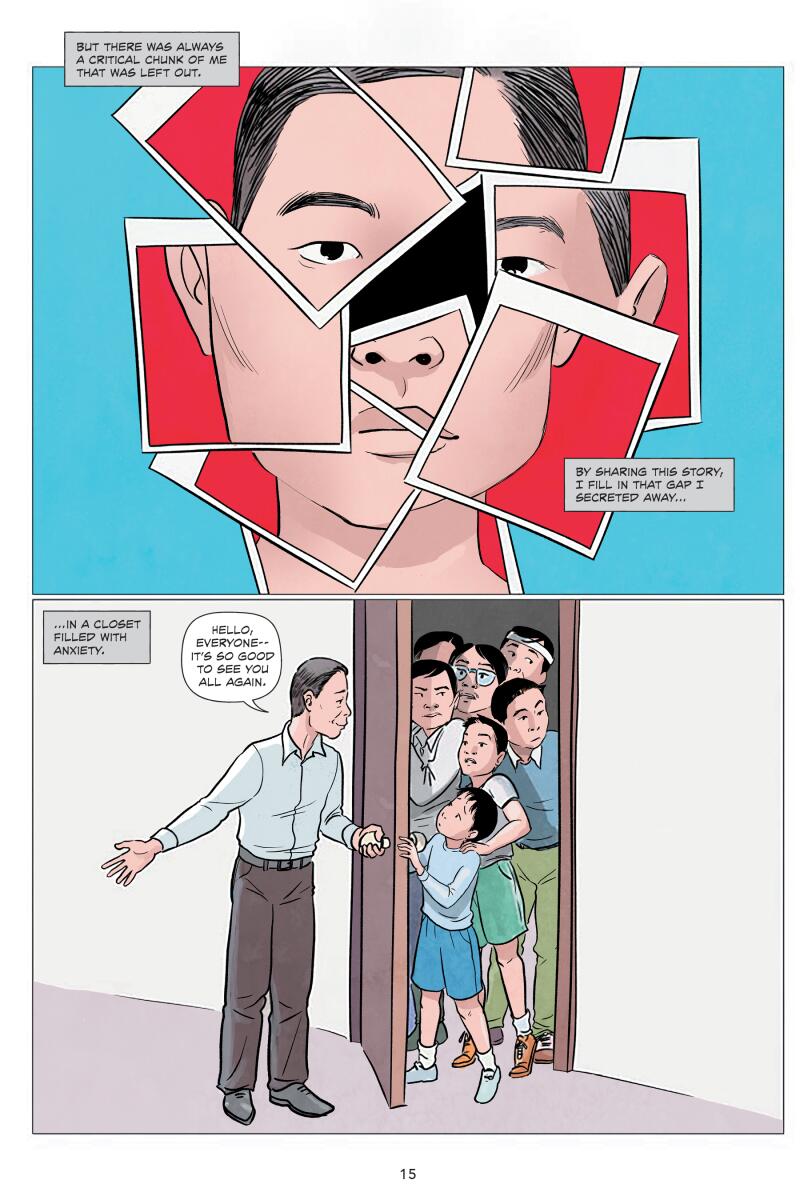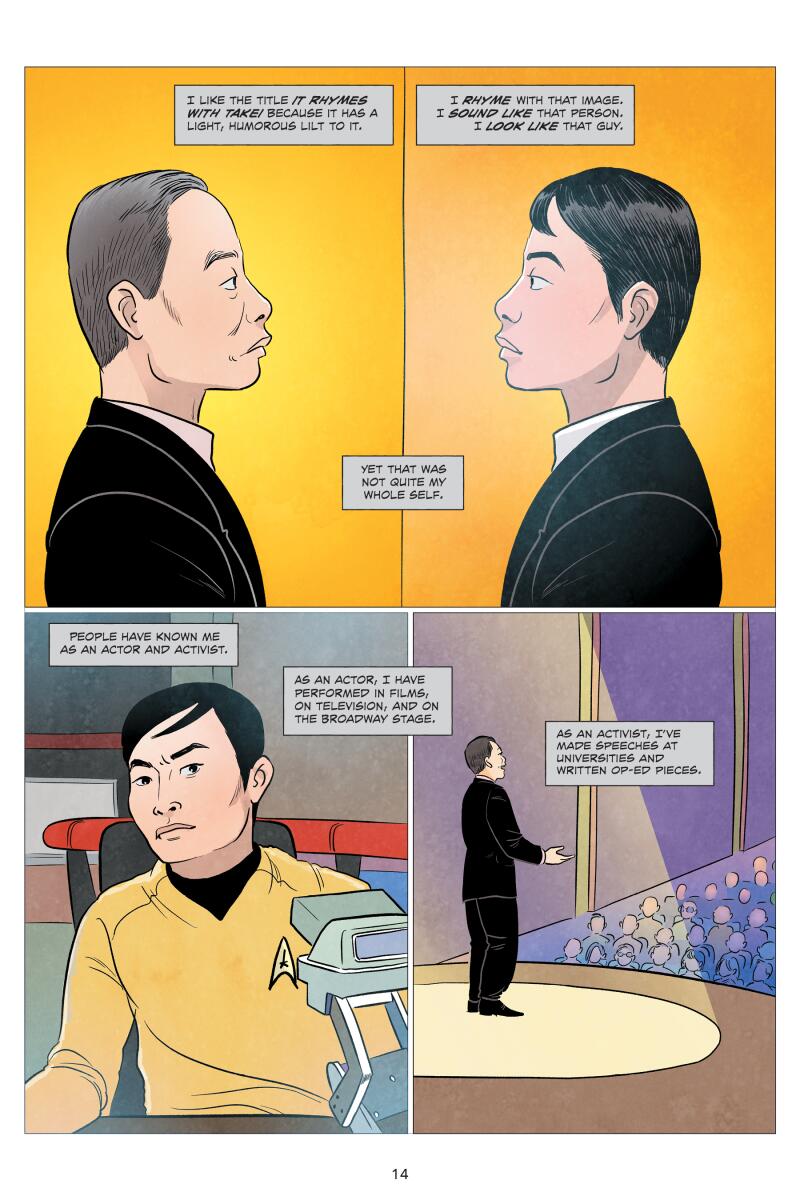On the Shelf
It Rhymes With Takei
By George Takei, Steven Scott, Justin Eisinger and Concord Becker (illustrator)Prime Shelf Productions: 336 pages, $30If you purchase books linked on our website, The Occasions might earn a fee from Bookshop.org, whose charges help unbiased bookstores.
Earlier than George Takei broke out together with his function on “Star Trek” and have become a cultural icon, his final identify was usually mispronounced.
As a substitute of “tuh-kay,” some individuals would say “tuck-eye.”
“I told them that’s a mispronunciation, but I don’t object to it because the word takai in Japanese means ‘expensive,’” the actor and advocate says throughout a latest Zoom name from Boston. “In fact, I told this to [‘Star Trek’ creator] Gene Roddenberry when he was interviewing me and he said, ‘Oh my goodness, a producer doesn’t like to call an actor expensive. Takei is OK.’”
Having to coach individuals about his identify is without doubt one of the causes he included it within the playful title of his newest graphic memoir, “It Rhymes With Takei.”
“I didn’t want it to be in their face,” says Takei. “I thought I’d use [my name] in the title and make the reader work a little bit … Takai? Takei? May, day, pay, say, gay. Oh, gay!”
Out Tuesday, “It Rhymes With Takei” is in regards to the actor’s experiences rising up homosexual at a time when it was a lot much less secure — and thus much less widespread — to be out. The guide particulars Takei’s story from his earliest childhood crushes to being compelled to come back out in 2005 and turning into the outspoken LGBTQ+ rights activist he’s as we speak.
For “It Rhymes With Takei,” the writer as soon as once more teamed up with writers Steven Scott and Justin Eisinger and artist Concord Becker, his collaborators for “They Called Us Enemy,” the 2019 graphic memoir about Takei’s childhood imprisonment in incarceration camps throughout World Struggle II.
Takei isn’t any stranger to sharing private tales. Along with his books, he has been the topic of a documentary. There’s a musical loosely impressed by his time in wartime incarceration camps. Within the final 20 years, he’s additionally mentioned his experiences as a homosexual man, particularly because it pertains to the rights of the LGBTQ+ group, however “It Rhymes With Takei” is his first deep dive into his full story.

Pages from “It Rhymes With Takei,” a graphic memoir by George Takei, Steven Scott, Justin Eisinger and Concord Becker. (Prime Shelf Productions)
Born in Boyle Heights, Takei was simply 5 when he and his household had been compelled out of their Los Angeles dwelling as a part of the mass incarceration of Japanese Individuals throughout the struggle. As a result of he was unjustly persecuted for his id and perceived as “different,” when he realized he was totally different in one other method, he stored it near his chest.
“I grew up behind very real barbed wire fences, but I created my own invisible barbed wire fence … and lived most of my adult life closeted,” says Takei, 88, who got here out when he was 68. “My most personal issue had me imprisoned. … It was a different society that I grew up in. Being closeted was the way to survive if you’re LGBTQ.”
“But at the same time as I remained closeted, society was starting to change,” Takei continues. “It was changing because some LGBTQ people were brave enough [and] determined enough to come out and be active and vocal and engaged.”
Since popping out in 2005, Takei has been vocal about points affecting the LGBTQ+ group, wielding his fast wit and gentlemanly poise — in addition to his huge platform — to denounce discrimination, blast homophobic public figures and name out different injustices.
In 2011, as an illustration, Takei supplied his identify for use as an alternative choice to the phrase “gay” when Tennessee lawmakers had been shifting to ban lecturers from any dialogue of sexual orientation within the classroom. He continued to talk out in opposition to the so-called “Don’t Say Gay” invoice when extra states had been pushing variations by their legislatures throughout a surge in anti-LGBTQ+ sentiment in 2022.
As Takei shares tales about his household shifting to Skid Row after being launched from the wartime incarceration camps, getting launched to radio and comedian books as he adjusted to his new life and the aspirational beliefs upheld by “Star Trek,” he sometimes glances offscreen to banter together with his husband, Brad, who’s out of body however shut sufficient to interject if he chooses. They’re the form of snug exchanges that come naturally between longtime {couples}.
However for many of his life, Takei believed that he couldn’t be out if he needed to pursue an performing profession. He’d seen firsthand how rumors or getting outed affected the careers of others. And Takei admits that he felt responsible watching fellow members of the LGBTQ+ group as they fought for his or her rights whereas he remained silent.

George Takei says he was “raging with anger” when the governor vetoed California’s marriage equality invoice in 2005.
(Guerin Blask / For The Occasions)
When then-Gov. Arnold Schwarzenegger vetoed a wedding equality invoice handed by California’s legislature in 2005, Takei knew he may not stay on the sidelines.
“I was so raging with anger,” says Takei, who didn’t reference Schwarzenegger by identify. “We were getting so close [to marriage equality] and I was really elated. But we had a governor that was campaigning by saying, ‘I have no problem with it but I’m against it.’ … When the bill passed by both the Senate and the Assembly [and] landed on his desk, he vetoed it.”
“The hypocrite,” Takei continues with a raised voice, alluding to Schwarzenegger’s extramarital affair. “I was so angry and determined to come out and join in on the fight.”
Takei already had a status for preventing for causes he believed in. He volunteered with a humanitarian group and was concerned with pupil authorities at Mt Vernon Junior Excessive. He was energetic in native politics within the Seventies and ‘80s. He’d additionally lengthy been part of the civil rights motion and opposed the Vietnam Struggle.
“Participation in democracy, taking on the responsibility of democracy, was something that I was taught as a teenager to put our internment in context,” says Takei. “That led me to volunteer for other causes.”
Takei credit his father for instilling this sense of accountability in him. As a youngster, when Takei turned taken with understanding his childhood imprisonment past his personal reminiscences, he would sit down together with his father after dinner to ask him about their time within the incarceration camps. Throughout these conversations, Takei says his father would quote Abraham Lincoln’s Gettysburg Tackle.
“‘Ours is the government of the people, by the people and for the people,’” says Takei. “Those are noble ideals. That’s what makes American democracy great. But the weakness of American democracy is also in those words … because the people are fallible. They make mistakes.”


Pages from “It Rhymes With Takei,” a graphic memoir by George Takei, Steven Scott, Justin Eisinger and Concord Becker. (Prime Shelf Productions)
Whilst these hard-fought rights have been backsliding lately as extra states have moved to move anti-LGBTQ+ laws, Takei stays hopeful.
“Life is cyclical,” says Takei. “It goes in circles. … We’re constantly changing and transforming our society and ourselves.”
He factors to how the Alien Enemies Act, which was invoked throughout World Struggle II to wrongly justify the incarceration of 120,000 Japanese Individuals, is as soon as once more being cited by the present administration in its efforts to deport immigrants. (Takei’s feedback preceded the immigration raids and protests that occurred in L.A. over the weekend.)
“We have this egocentric monster [in office],” says Takei, elevating his voice a second time. “He’s power-crazy and … now he’s causing all sorts of outrageous inhumanity — it’s beyond injustice, it’s inhumanity — and we’re going through that again. The same thing that we went through [when we were] artificially categorized as enemy alien in 1942.”
Takei by no means as soon as mentions Trump by identify, as an alternative calling him “a Klingon president,” referencing a widely known alien race from the “Star Trek” franchise.
“Klingons are the great threat to a more enlightened society who can see diversity as their strength,” says Takei. “We’ve got to be rid of him.” The depictions of Klingons have shifted through the years, nevertheless it’s clear Takei is invoking the extra brutal, prideful and authoritarian model launched within the unique collection within the Nineteen Sixties. And in Roddenberry’s extra idyllic imaginative and prescient of the long run, humanity’s power is in its variety. (“Infinite diversity in infinite combinations,” says Takei.)
“I’m still optimistic,” says Takei. “These momentary blips in history eventually get overcome and are left behind. We will find our true path.”


